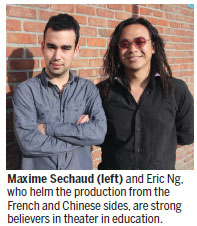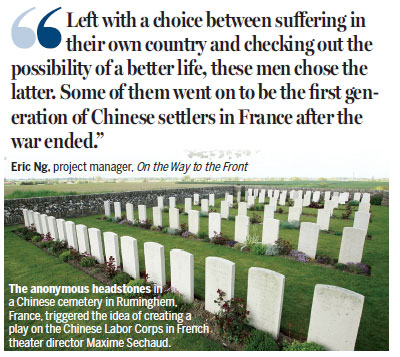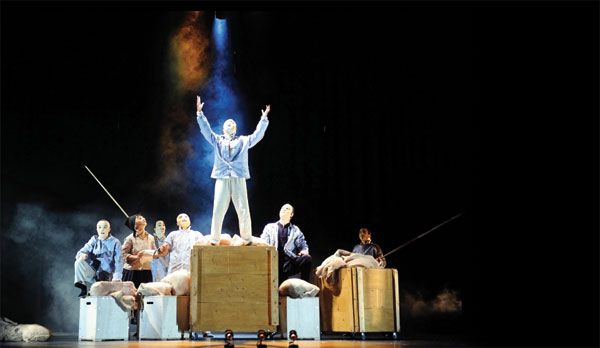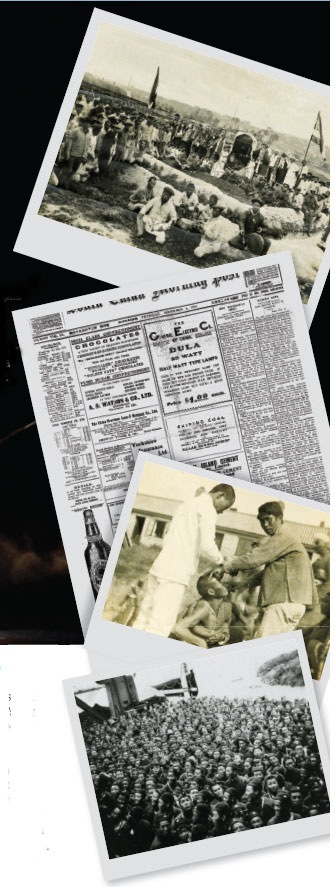History unmasked
Updated: 2015-06-26 07:25
By Chitralekha Basu(HK Edition)
|
|||||||||
A French-Chinese co-production turns the spotlight on the Chinese Labor Corps, brave souls who battled a sea of odds to assist the war effort of the Allies during World War I. A report by Chitralekha Basu.
When Maxime Sechaud stumbled upon Erwan Frelaut, a Chinese cemetery in Ruminghem-a small village in the north of France -he had no idea the site would trigger the genesis of his new play. He had not heard about the Chinese Labor Corps. The local people had no clue about the 75 anonymous gravestones which were marked only by numbers. Sechaud, the artistic director of Theatre de l'Ordinaire, France, called Eric Ng of the Asian People's Theatre Festival Society in Hong Kong, with whom he had collaborated before, and Ng did not seem to know about the headstones either.
Sechaud was intrigued. The more he read about the Chinese Labor Corps -Chinese workers recruited by the British government to do menial jobs at the frontline during World War I-the more he was convinced this was a story that deserved a wide audience.
Sechaud's new play,On the Way to the Front,opened its Chinese odyssey in Hong Kong last weekend as part of the Le French May Festival. It's all set for a tourof different cities across the mainland, before returning to Hong Kong for street performances in August. The play is a re-imaging of the experiences of the 140,000 Chinese workers who arrived in the north of France to support the war effort of the Allies a century ago. Around 40,000 of them lost their lives during the war. The rest passed from memory, into near-total oblivion once the war was over.
During their time in France, the Chinese Labor Corps worked long hours in extremely hazardous conditions-unloading cargo from ships, digging trenches, repairing and building roads and railways. Summarily punished by their foreign employers when they failed to deliver or broke the rules, they had no labor rights to speak of andwere forbidden even to associate with the native French community.
"Racism is as rampant in France as it was then," says Sechaud. "It's only that racism and oppression exist in a different context. The idea behind putting up this play is to make sure people don't forget. The status of migrants seeking work in present-day France is definitely similar to what it was then, and it resonates with the work conditions of the migrant maids in Hong Kong."
For all the hardships, the prospect of a better life elsewhere continues to lure people to travel afar, as it did the Chinese who signed up to risk their lives and assist in a war that was not even their own."They were the prisoners of destiny," says Eric Ng, co-project manager of this collaborative production between theateractivists from Hong Kong and the Chinese mainland,which has dialogues in Mandarin, Cantonese, French and English. "Left with a choice between suffering in their own country and checking out the possibility of a better life-the possibility of hope-these men chose the latter. Some went on to become the first generation of Chinese settlers in France after the war ended."
After a show at the Chatellerault in France-performed close to a factory where some of the Chinese Labor Corps had found work after the war-an 84-year-old woman came up to Sechaud. She showed him photos of his father, saying she was touched by the way the play resonated with her family history.
The narrative in the play, however, is fictional. Thecharacter of the protagonist-native Hong Kong resident Lee Tai-man (played by Lee Chi-man) who leaves his elderly mother to goserve in the north of France,falls in love with a French girl and goes on to be a leader of the labor unrest -is an imaginary one, crafted on the basis of cues taken from a few fairly-recent accounts produced by historians, including one by the France-based Chinese academic, Li Ma. Sechaud said he started with a bare outline of the story which was fleshed out through workshopping the play with the actors.
Body language
The actors wear masks during the play. Masked theater, in the tradition of the Italian commedia dell' arte (comedy of the craft of improvisation), is Sechaud's forte, whereas the Hong Kong team of actors has worked with Korean and Chinese masks before. "Most of the cast members are well-trained in mime and physical theater," informs Ng, pointing out the performers' natural ability to compensate for what they cannot communicate through facial expressions.
The masks used for this production are painted, handkerchief-size pieces of fabric, strung tight against the face and tied at the back of the head. The feel is that of watching a puppettheateror a ventriloquist's dummy, in which the spectator cannot quite figure where the spoken words are coming from. As Louis Pick, who plays a typically seriocomic tyrannical British recruiting officer, says, "The great thing about using fabric masks is that it does not come from a tradition, and therefore there's no risk of deviating from the norm."
It was a great experience, he says, performing in Chinese cemeteries and factories where former Chinese Labor Corps members had worked. "We met people with links to the Chinese Labor Corps, got really close to the subjects in our play and had a glimpse into how they might have spent their time in the camps. And now we're here in China, getting to discover the culture of the place from where it all began," says Pick. "I'm excited to think a British officer like the one I play was right here. I ask myself, did he feel as hot as I am now?"
In the face of growing intolerance against people from other cultures, faiths and those with a different perspective on things-the recent Charlie Hebdo killings in Parisbeing a glaring example-staging a play such asOn the Way to the Frontbecomes particularly pertinent. Near to his home in Lille, Pick often sees illegal migrants being arrested as they wait to cross over to other countries in Europe.
There probably are better ways to deal with the situation, he suggests. "Often the crises that erupt between strangers have to do with misunderstanding. It's only by meeting with, sharing and talking to each other that we can fight racism and fascism. I hope this message is heard here in China through the play."
Contact the writer at basu@chinadailyhk.com
|
The story of Lee Tai-man, a fictional character based on historical accounts of the Chinese Labor Corps in France, forms the core of On the Way to the Front. |
|
Archival photographs of the recruitment of Chinese workers, during which they were often treated like cattle, has inspired a segment of the play. |


(HK Edition 06/26/2015 page7)

